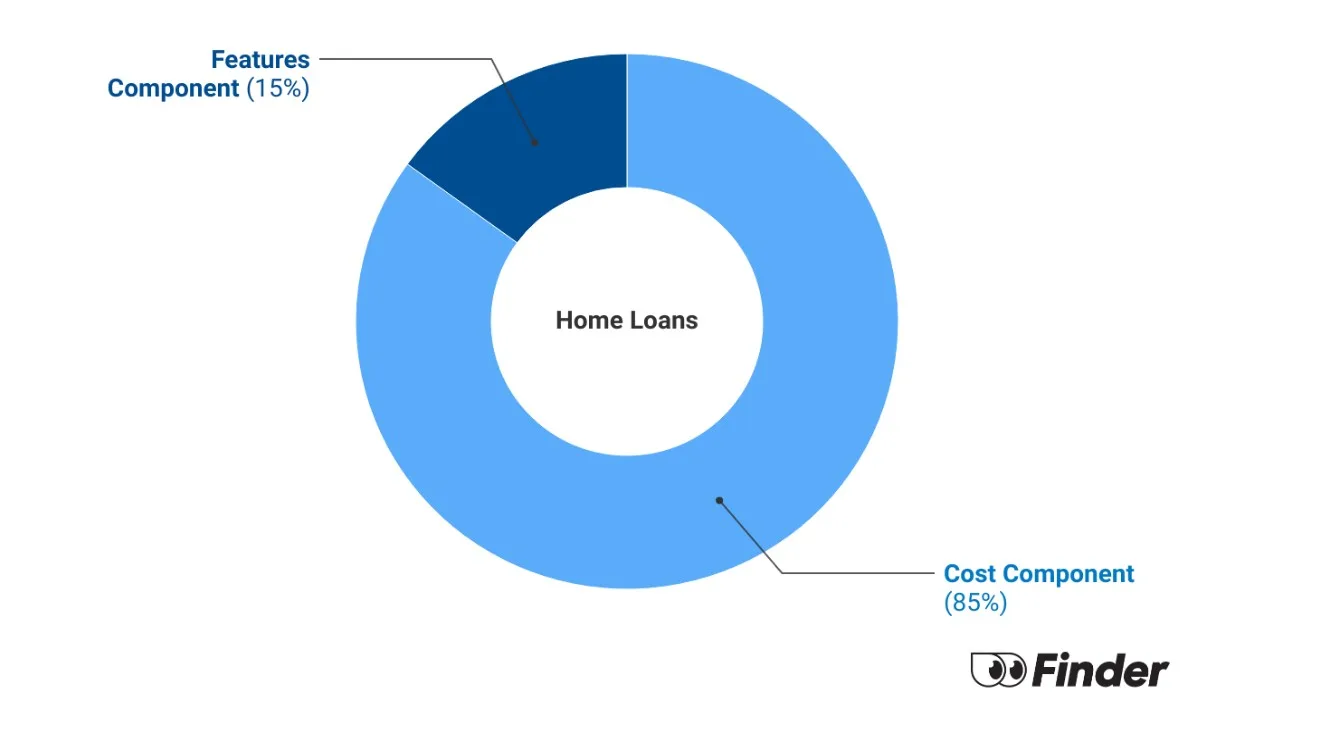Key takeaways
- By switching to fortnightly payments from monthly payments you'll end up making an extra monthly payment each year.
- This would mean you'll pay your home loan off faster and pay less interest over that time.
- You should check how your lender calculates its new payments though. If they divide your annual repayments into fortnightly repayments, you won't actually save any money.
How to use the fortnightly repayment calculator
To use the fortnightly repayment calculator you just need a few of your home loan details:
- Loan term: Select the number of years you took out the home loan for.
- Original loan amount: Enter the amount you borrowed for your home loan.
- Interest rate: Enter your current interest rate.
- Made repayments: Work out the number of monthly repayments you've already made. Note this is in months and not years.
You'll then see the calculations comparing monthly repayments, fortnightly repayments and weekly repayments.
The term bi-monthly in the calculator refers to your monthly repayment being split in half and then charged every 2 weeks. This is different to some fortnightly repayments where the cost is calculated from your annual repayment, which we explain below.
Not the calculator you were looking for?

"Some banks will allow you to change your repayment frequency, but they'll take your monthly repayment multiplied by 12 months and divided by 52 weeks. Then they'll multiply this by two for [lower] fortnightly payments.
Some lenders by nature will calculate it their own way and there's no two ways about it. But some lenders will calculate a true fortnightly repayment."
How banks calculate fortnightly repayments
There are 2 ways banks will calculate your fortnightly repayments and one of those ways doesn't save you money at all.
Option 1 - Bi-monthly fortnightly repayment: Your lender splits your monthly repayment in half. You repay that amount every 2 weeks. Because there are 26 repayments in a year and not 24, you'll make an additional month's repayment over the year.
Option 2 - Annual fortnightly repayment: Your lender will take your annual repayment and divide it by 26 for the number of repayments you'd make that year. This means your fortnightly repayments will be lower, but you'll repay the same amount annually as you would have if you kept your monthly repayment.
How fortnightly repayments can save you money
Let's take a look at how a $600,000 home loan on an interest rate of 5% over 30 years would fare with each repayment method:
Monthly repayment
Your monthly repayments would be $3,220.93. That's an annual repayment of $38,651.16. You'd pay a total of $1,159,534.71 over the 30 year loan.
Bi-monthly fortnightly repayment
You'll be paying $1,610.46 a fortnight. This means you make an annual repayment of $41,871.96. That's an extra $3,220.80 a year (a whole extra month's repayment) which will cut your home loan by 4 years and 6 months. You'll save more than $80,000 in interest.
Annual fortnightly repayment
Your fortnightly repayment would be a lower repayment of $1,486.52. You'd pay the same amount annually as if you'd kept your repayment monthly. Therefore you'd save no time or interest on your loan.
Not sure what your repayments should be?
Use our mortgage repayment calculator to work out your costs.
What to be aware of with fortnightly home loan repayments
Although fortnightly home loan repayments should save you money over the long run, there are a couple of reasons they might not work for you.
- Your pay cycle. If you get paid monthly you might find it easier to pay your home loan monthly too, rather than making sure you have the right amount of money in the right account when your home loan repayments are due. This doesn't mean you can't benefit in the same way as someone making fortnightly repayments. If you put aside the money and your loan allows extra repayments, simply pay an additional month's repayment into your loan each year. Or more if you can spare it!
- Mortgage stress. Paying fortnightly means you make an extra month's repayment each year. That's because months (mostly) aren't exactly 4 weeks. When you pay every fortnight there are 2 months of the year which have an extra repayment. You need to make sure you have the budget flexibility for those months. If you're struggling with your home loan repayments as it is, having that extra repayment twice a year can make things much harder.
Compare your mortgage options today
Compare other products
We currently don't have that product, but here are others to consider:
How we picked theseWhat is Finder Score?
The Finder Score crunches 7,000 home loans across 120+ lenders. It takes into account the product's interest rate, fees and features, as well as the type of loan eg investor, variable, fixed rate - this gives you a simple score out of 10.
To provide a Score, we compare like-for-like loans. So if you're comparing the best home loans for cashback, you can see how each home loan stacks up against other home loans with the same borrower type, rate type and repayment type. We also take into consideration the amount of cashback offered when calculating the Score so you can tell if it's really worth it.
Disclaimer: It is advised that borrowers speak with a mortgage broker or accountant regarding their home loan structure and repayment frequency to ensure that it will suit their financial situation.
Frequently asked questions about fortnightly home loan repayments
Sources
Ask a question
4 Responses
More guides on Finder
-
Home Loan rate cut calculator
Use our simple rate cut calculator to work out how much you'll be saving with the latest interest rate cuts.
-
Lenders mortgage insurance (LMI) calculator
Finder's simple, free LMI calculator can help you estimate your lenders mortgage insurance premiums.
-
Comparison rate calculator
The comparison rate represents the actual cost of a home loan by taking into account its interest rate and any additional fees charged by the lender.
-
Home equity calculator
Home equity can help you access extra financing from lenders to spend on things like home renovations or investment properties. Find out how you can calculate the equity in your home.
-
Home loan eligibility calculator
Check out our home loan borrowing power calculator to see if you'll be able to afford the loan you want.
-
Interest-only home loan calculator
Estimate the cost of your repayments if you only pay the interest portion of your loan with an interest-only mortgage.
-
Offset calculator
An offset account calculator can help you estimate the savings of a 100% home loan offset. Calculate your savings and compare 100% offset home loans today.
-
Home loan lump sum calculator
Use a lump sum repayment calculator to see how much you can save in interest and fewer mortgage repayments. It's quick, free and easy to use.
-
Extra mortgage repayment calculator
Our extra loan repayment calculator helps you see how you could save big on interest. Free, fast and easy to use - calculate in 1 minute!


Just in regards to this. What if you had an offset account set up and you were able to place those fortnightly repayments into the account anyway for the repayments to then be taken out monthly ?
Hey Daniel!
Thanks for the question.
The effect of fortnightly or bi-monthly repayments is to add an extra monthly repayment towards your home loan each year, so a similar effect might be able to be obtained by depositing similar extra amounts into an offset account. You might want to go through the sums with a mortgage broker, accountant or with your lender to find out exactly how it’ll affect your loan term.
I hope this helps,
Marc.
Should I be paying a fixed loan differently? Currently it is being paid weekly.
Hi Denise,
Thank you for contacting finder.com.au, a financial comparison website.
Each individual’s specific circumstances and needs are different and they should pay off their loan in a way that suits them, you can use the calculator on this page to see how changing the repayment frequency of your loan will affect your circumstances.
If you want further advice I would recommend speaking to a mortgage broker, financial advisor or your lender directly.
Regards
Jodie